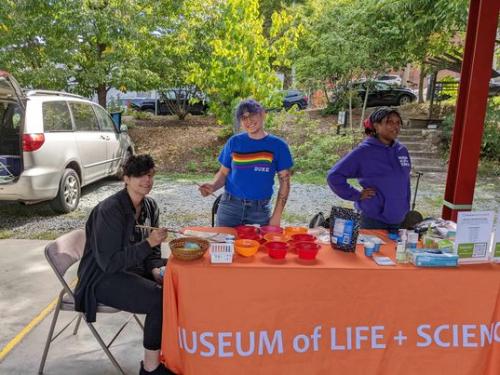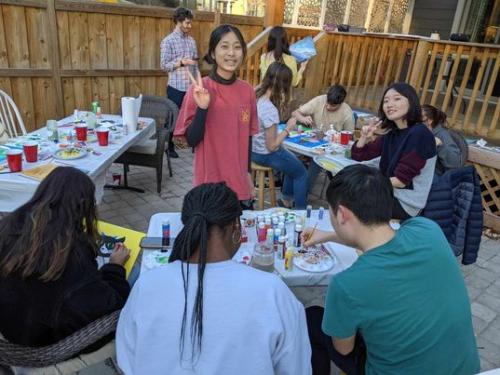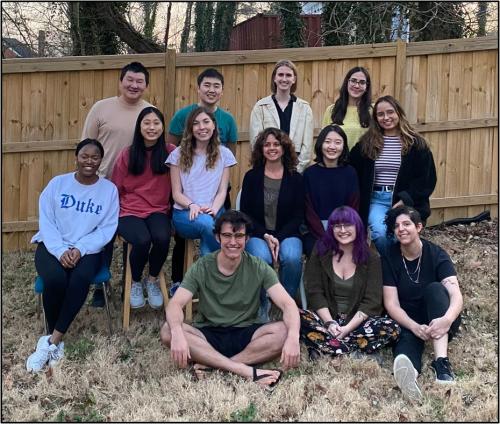
Jessa Stegall
Jessa came to Duke after her time as an elementary teacher, which inspired her research on moral obligation in kids. When she’s not trying to understand young minds in the lab, you might find her reading tarot cards or a Jane Austen novel.
Trainee Spotlight is a series of interviews from the Duke Institute for Brain Sciences that showcases the science and lives of the people behind the lab coats studying the brain at Duke. Want to suggest someone for the series or nominate yourself? Email the DIBS Director of Communications Dan Vahaba.
This interview has been edited for length and clarity.
How did you get started in science?
Funnily enough, I was more interested in philosophy than I was psychology in undergrad at Michigan State University. I did a dual major, but there weren't many opportunities to actually engage in science. What got me really interested in science was teaching. Right after undergrad, I was part of the 2017 Teach for America Corps in Arizona, essentially filling gaps for teacher shortages until they can get better funding for more long-term educators. I saw how kids applied rules, figured out social situations, and became people with identities having moral qualms.
I focused a lot on ethics in undergrad—these lofty philosophical ideas like, how do you be a good person? How do we live a good life? Then when I went to teaching, I started thinking about how people come to understand these questions and apply them. I basically took philosophical ideas and translated them into what people do in the real world, so it became psychology. And then I wanted to know where they came from, so it became developmental psychology.

What’s your big research question in the Kushnir and Tomasello labs?
How do we understand our own obligations? How do we come to understand what we owe other people, and how do we regulate our own actions to reflect that? There's a lot of work, especially when it comes to children, about how other people influence what they do and how they think, but there's less on how that becomes self-sustaining. How do children manage their reputation? Young children are more helpful when other people are watching them or when they get a reward, but when do they start being helpful because they're the type of person who is helpful? When does it start becoming cyclical, reflective of their own character?
Is there anything you're working on right now that you're particularly excited about?
I’m in the process of reworking one of my projects on obligation. This one would look at what kinds of social cues indicate an obligation in a social scenario. One of my advisors, Dr. Tomasello, has this idea of joint attention, where if you and I are engaging in something together, and we indicate that we're partners in it, we have different obligations than if you were just somebody I was sitting next to, where you're doing your task and I'm doing mine. In the second case, I don't feel the need to answer to you, to hold you accountable or help you if you need help.
We're building on a study about that, seeing if children think that a person participating in joint attention is more obligated to help somebody when they suddenly have a need than they would have been otherwise.
Has your experience teaching changed how you approach your research?
Before, I didn't really know what kind of questions you could even ask in that realm because a lot of my work in psychology had only been with adults up until then. Also, I think a lot of my research is motivated by how you manage a classroom. How do you get children to be responsible for themselves and their own learning, for their peers? How do you teach children to set examples? As a teacher, it was really difficult to get children to hold themselves accountable, which was my most inspirational motivator for going to grad school.
You're an incoming third-year student, so you’ve been here for a couple of years. How has your experience been so far in the Triangle?
I was actually really nervous to move to Durham because I had never lived in the South before. I was moving from San Francisco, this big city, but I really love it here. I love the weather. I think everybody's really nice. It has got this great balance of stuff to do—there is a happy middle ground of community, but not as overwhelming as a big city.

Where’s your favorite place to go in the area?
My partner and I love Namu. We go there to work all the time. They have this yuzu tea that I'm obsessed with that has yuzu jam and sparkling water. It's delicious. I highly recommend it.
What are you looking to do after you’ve finished at Duke?
I want to do exactly what my advisors, Dr. Tamar Kushnir and Dr. Tomasello, do. I want to be a professor, have a moral development lab, and mentor graduate students.
What is something people might not know about you?
I collect rocks and crystals! My favorite is rose quartz, which is a very basic answer, but it's the stone of unconditional love. Any time somebody goes on a trip and they're like, Jessa, what do you want? Bring me a rock! I have rocks from almost all 50 states. They're taking over my office.
I’m an amateur tarot reader, too. I'm not very spiritual, but I do think it's a great self-reflection tool, and I think it's really fun.
I am also a Jane Austen enthusiast and I really like classic gothic literature. I even did an honors thesis on feminist literature from the 17th to 21st century. The project looked at the changing public critique of women authors and how their imperfect women characters were portrayed. Jane Austen was, from my understanding, not considered a high-quality writer until after her death, and her characters went from morally inept by readers to feminist icons as social views on women’s roles shifted.
What is the best tip you can give somebody entering your field?
My lab mates are going to laugh at me, but when I was interviewing for graduate school, I asked people if they were friends and if they hang out. It was an awkward question, but you can tell what the dynamic is from questions like that. When you're doing work like this, it's such a long haul. It takes so much time and patience and support from other people. You really want to find people who will be there to support you and who will go and hang out with you later so that you're not just hyper-focused on your work all the time. Probably the best decision I made during my entire interview process was asking that question. Community is so important.

If you are a Duke undergraduate, graduate, or postdoc student studying the brain and would be interested in taking part in an interview for this series or would like to nominate somebody, please reach out to Dan Vahaba, Director of Communications at DIBS.